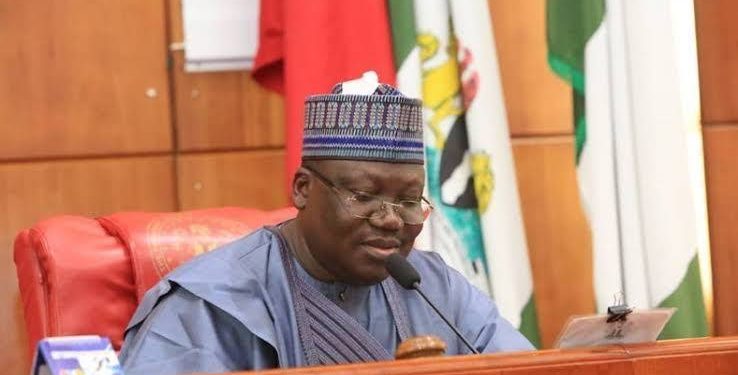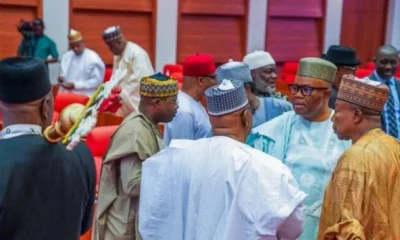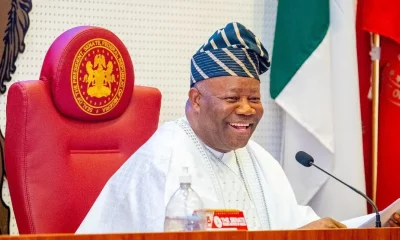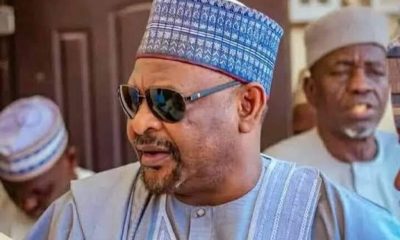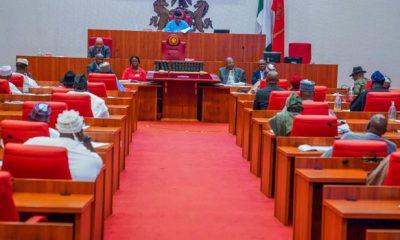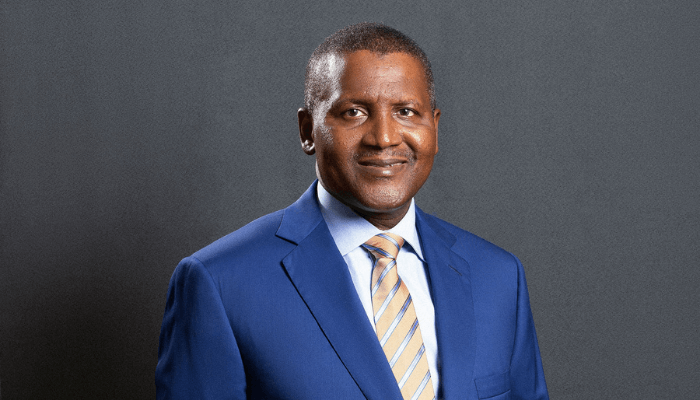The Senate has passed the Petroleum Industry Bill (PIB) with a provision that granted the use of 30 per cent of oil and gas profits of the Nigerian National Petroleum Corporation Limited to fund oil exploration activities in frontier basins.
The passage of the bill was, however, not without drama at plenary on what percentage of operating expenditure of oil companies should constitute funds earmarked for host communities’ development in the Bill.
Senate President Ahmad Lawan said the passage of the historic bill marks a watershed for the 9th Assembly, saying: “PIB demons have been defeated.”
The passage of the Bill followed the consideration of the report of the Senate Joint Committee on Downstream Petroleum Sector; Petroleum Resources (Upstream); and Gas on a “Bill for an Act to provide Legal, Governance, Regulatory and Fiscal Framework for the Nigerian Petroleum Industry, the development of Host Communities and for related matters, 2021,” popularly called the Petroleum Industry Bill (PIB).
The lead Chairman of the Joint Committee, Senator Sabo Mohammed Nakudu presented the report.
The Senate, after due consideration, approved that host communities would henceforth enjoy 3 per cent ($502.8million) of annual operating expenditure of oil firms to be contributed into the host community development trust fund.
However, Deputy Senate President, Ovie Omo-Agege, in his contribution, pleaded with the Senate to increase the 5 per cent proposed for the development of host communities in the Bill.
Nakudu said: “The Joint Committee’s recommendation recognises the need for the country to urgently and aggressively explore and develop the country’s Frontier Basins to take advantage of the foreseeable threats to the funding of fossil fuel projects across the world due to speedy shift from fossil fuel-to other alternative energy sources.
“To this end, the Committee recommends funding mechanism of thirty percent (30%) of NNPC Limited’s profit oil and profit gas as in the production sharing, profit sharing, and risk service contracts to fund exploration of frontier basins.”
On funding for host communities, the joint Committee had earmarked five per cent but the Senate slashed it to three per cent operating expenditure of oil firms.
Nakudu said: “This chapter highlights the effective and efficient administration of the Host Community Trust Fund which is to be anchored by the settlor, i.e. the oil and gas companies operating in the host communities.
“The various recommended provisions when passed into law, will ensure a peaceful operating environment that will have a positive direct impact on the cost of oil and gas production which has been the bane of the Nigerian oil and gas industry.
“After extensive engagements with various stakeholders and on-the-spot assessment visits to host communities across the country, the Joint Committee recommended strengthening measures and saddled the host communities with responsibilities with a view to reducing or completely eradicating interferences and tampering in the country’s oil and gas production assets.
“Furthermore, to ensure adequate development of the host communities and reduction in the cost of production, the Joint Committee recommends five per cent (5%) of the actual annual operating expenditure of the preceding financial year in the upstream petroleum operations affecting the host communities for funding of the Host Communities Trust Fund.”
Earlier, Omo-Agege said even though the five per cent provision for host community development in the Bill was arrived at after due consultation, he called for a slight increase to assuage the feelings and pains of oil bearing communities.
He noted that while the Niger Delta people want a deal, “a no deal is better than a bad deal.”
Omo-Agege said: “Today I speak not as the deputy Senate President but I speak as the senator representing Delta Central Senatorial District.
“For us in the Niger Delta there are three areas that are of much interest to us. I’m sure my other colleagues will speak to it.
“On the whole, the major thrust, the rationale for pushing for this Bill which has eluded this country for so many years is for us to get a law in place that will create an enabling environment for foreign investors coming with their money to invest in the sector before as we were told, our oil will go out of fashion.
“Some of us have this belief that no matter the thinking of the investment community, oil will always be relevant. Some of them have made the case that in the next 10 to 15 years, there will be no use for oil.
“Mr. President, this may be acceptable to a lot of people in this country but in my Senatorial District and indeed in most of Niger Delta, they are prepared to let this oil remain on the ground until may be another 40 to 50 years when there may be need for oil again.
“What does that mean? Mr. President, they want a deal, but they want a good deal. Sometimes Mr. President, no deal could be better than a bad deal.
“Mr. President, when we raise these issues, I want to thank you most especially. I want to thank the Senate Leader and the leadership for the leadership role you played in arranging for our colleagues to meet and engage and come with some sort of accommodation.
“And Mr. President, this Bill as originally conceived provided only 2.5 per cent contribution by sector companies to the host communities trust fund. This is not the first experiment or first attempt.
“Mr. President, I will still make a case if possible that we go a little more than the five per cent already agreed.
“I understand we cannot meet the 10 per cent. But that is the clamour at home. I need to plead that if there is a chance we can go a little more than the five per cent, we will be grateful.”
Co-Chairman of the Joint Committee, Senator Bassey Albert Akpan, noted that the 5 per cent provided for host communities in the Bill connotes that property and equipment of oil companies will be secured by host communities or part of the trust fund would be used to remedy any damage or theft.
However, it was learnt that the Senate decided to reduce the five per cent earmarked for host community trust fund to three per cent following the closed door briefing of lawmakers by the Minister for State, Petroleum Resources, Timipre Sylva and Group Managing Director of the NNPC, Mele Kyari.
Efforts by Omo-Agege, Senators George Sekibo and James Manager to get a better deal for the development of host communities, however, failed.
During the clause by clause consideration of the Bill, Senator Ahmad Babba Kaita (Katsina North), proposed an amendment to the effect that if the contribution to host communities trust fund is pegged at three per cent, government will ensure security of oil firms’ equipment but if it is five per cent, communities would be responsible for securing production equipment in their domain. When it was put to voice vote, the 3 per cent sailed through.
Apparently, peeved by the development, Sekibo called for a division of the Senate citing order 73 of the Senate Standing Orders.
Senate President Ahmad Lawan and Senate Leader, Yahaya Abdullahi, prevailed on Sekibo to withdraw his motion in view of the “existing unity in the Senate.”
Sekibo withdrew his motion and pleaded that the three per cent be increased by retaking the vote on the amendment earlier proposed by Kaita.
Lawan thanked Sekibo for his statesmanship in withdrawing his motion but declined to call for a fresh vote on Kaita’s motion.
“We have already ruled and it is against the provisions of the Standing Orders of this chamber to revisit a matter already ruled upon by the Presiding Officer,” Lawan said.
Senator Manager in his remarks described the three per cent of operating expenditure of oil firms earmarked for the host communities’ development trust fund as a “bitter pill to swallow.”
Senator Nakudu later told Senate Correspondents that the three per cent provision is “a lot of money”.
He said the three per cent translates to over a half a billion dollars annually.
He said the percentage was reduced from five to three to encourage investors.
He added that the three per cent was in addition to other statutory funding arrangements already accruing to the Niger Delta region.
Spokesman of the Senate, Senator Surajudeen Ajibola Basiru, said the three per cent amounted to $502.8million annually.

 News3 years ago
News3 years ago
 Entertainment2 years ago
Entertainment2 years ago
 News3 years ago
News3 years ago
 Privacy3 years ago
Privacy3 years ago
 Sports2 years ago
Sports2 years ago
 Entertainment2 years ago
Entertainment2 years ago
 News3 years ago
News3 years ago
 Opinion3 years ago
Opinion3 years ago
